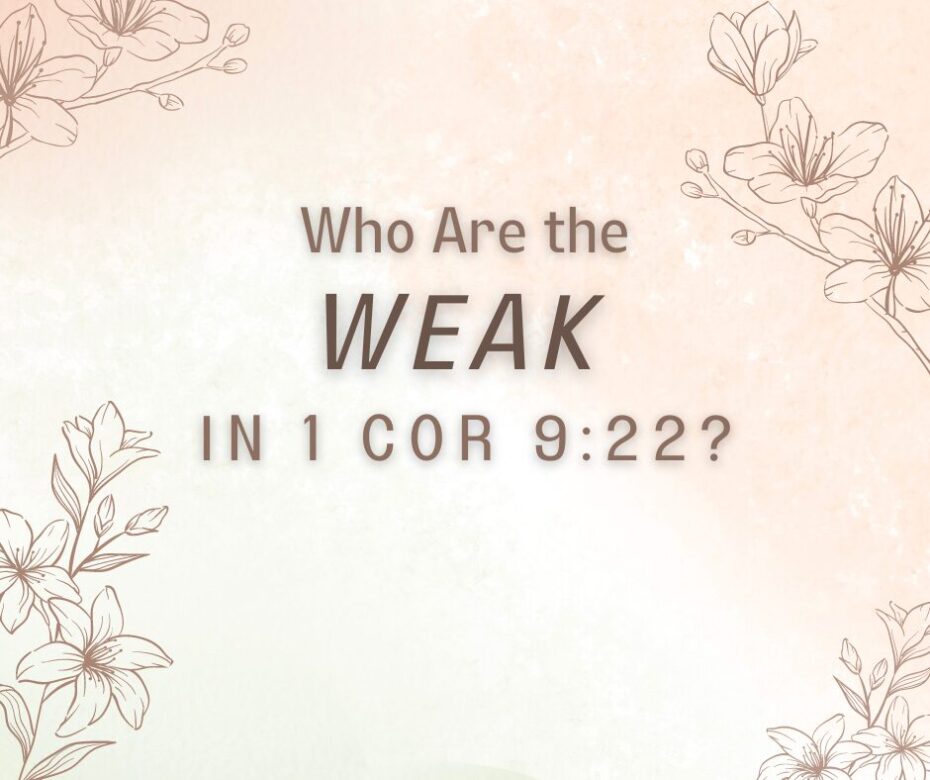In 1 Corinthians 9, the Apostle Paul states:
…to the weak I became as weak, that I might win the weak. I have become all things to all men, that I might by all means save some. 23 Now this I do for the gospel’s sake, that I may be partaker of it with you (1 Cor 9:22-23).
This well-known passage is often seen as a guide for evangelism. The salvation described here is traditionally understood as eternal salvation, and the gospel is understood as the saving message for unbelievers. These verses, therefore, are often used to tell us how to win unbelievers to Christ.
However, the context does not support an evangelistic purpose. This is made clear when the weak in v 22 is defined.
In the previous chapter, Paul spoke about his conduct within the church regarding eating meat sacrificed to idols (8:4). This was a bone of contention in the early church; some felt it was sinful to eat such meat, while others were not opposed to doing so. Paul says that it is not sinful to eat the meat (v 4). Believers have liberty in this area. However, if a brother is opposed to eating it, he should abstain. If a meat-eating believer is around such a brother, he should also abstain. The Apostle Paul defines the weak:
9 But beware lest somehow this liberty of yours become a stumbling block to those who are weak. 10 For if anyone sees you who have knowledge eating in an idol’s temple, will not the conscience of him who is weak be emboldened to eat those things offered to idols? 11 And because of your knowledge shall the weak brother perish, for whom Christ died? 12 But when you thus sin against the brethren, and wound their weak conscience, you sin against Christ. 13 Therefore, if food makes my brother stumble, I will never again eat meat, lest I make my brother stumble (1 Cor 8:9-13, emphasis added).
The weak in this passage are the believers at Corinth who struggled with eating meat sacrificed to idols. Paul is not discussing unbelievers. He is describing conduct within the church. Paul is an example of a believer who willingly gave up certain liberties (8:4-6; 10:23-25) in order to minister to the Body of Christ. When Paul was around such brothers, he abstained from eating the meat for fear of making those brothers in Christ stumble and sin.
Paul became all things to those in the church in order to save them from perishing (see also 10:31-33). This perishing doesn’t refer to eternal salvation, since Paul is addressing believers. Rather, he is describing the spiritual health of the weak brother. He doesn’t want to see him fall into sin and ruin because Paul was unwilling to set aside his preferences.
This reflects the message of the whole letter. The church at Corinth was struggling with sin. Their carnal conduct, immature behavior, infighting, and pride were leading them to destruction. Paul wanted the church at Corinth to be spiritually healthy at the Judgment Seat of Christ and to be saved from a negative experience on that day. This is reflected in the apostle‘s words in the following verses; he gives himself as an example of one who runs the Christian life so that he won’t be disapproved at the Judgment Seat of Christ (9:24-26). The believers at Corinth needed to be saved in this way. In other words, Paul is discussing the sanctification of believers at Corinth, not the eternal salvation of unbelievers.
Paul is doing this for the sake of the gospel (9:23). The word gospel in the Scriptures can refer to many things, not just the saving message of eternal life by faith alone. The good news in 1 Corinthians includes the coming resurrection of believers, and that those who hold fast will be rewarded (3:15; 9:24-26; 15:1-2, 39-41, 58). This is reflected in the immediate context of chapter 9, as the Apostle Paul explains that he disciplines himself so that he can be approved by the Lord and receive an imperishable crown (vv 24-26).
Paul is not saying that he becomes all things so that unbelievers will be saved from hell. Rather, he is describing his conduct in the church so that he can better serve fellow believers. He wants them to be won over and to become spiritually healthy. It reminds us that while the Church is called to love the fallen world, we must not forget that our primary responsibility is to one another (Gal 6:9-10).

